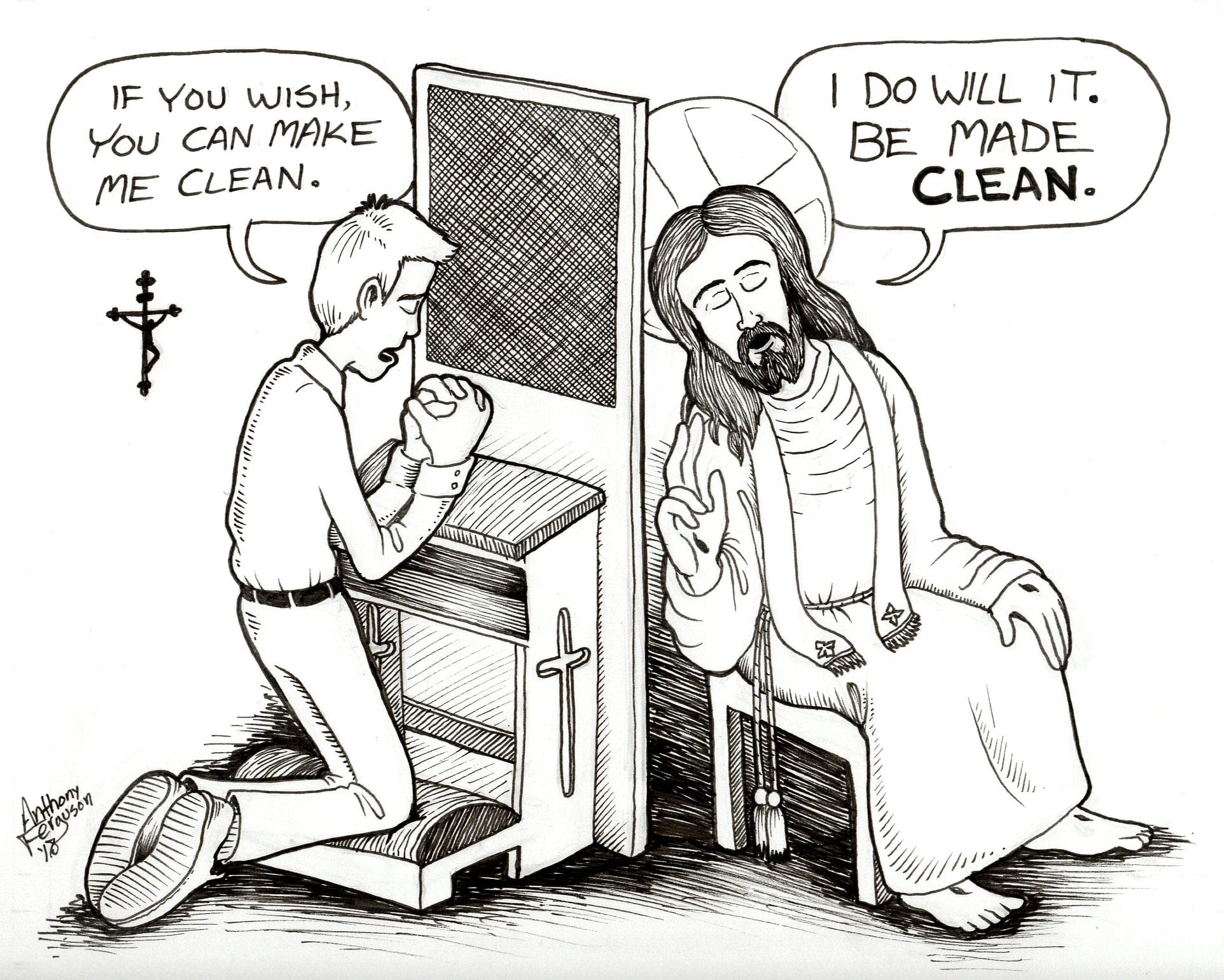Sometime we can feel so dirty, so unworthy, so unclean that we have a hard time imaging that God would want us anymore.
Have you ever felt that way?
This is what we might call “shame.” Shame is a devastating experience because it can lock us into the idea that because of what we’ve done, because of our failure to love or our shortcomings in this or that virtue — then we are now irredeemably bad. That we are ruined. That God couldn’t possibly love us anymore. We feel like we’re covered in leprosy, even! Ew… yuck! Stay away from them…!
Sometimes, if we let shame do all the talking, we might even start to think that God is… repulsed… by us because of our many failures and sins.
But this weekend’s Gospel reveals to us a beautiful truth that absolutely annihilates all of that:
In the encounter of Jesus with this Leper, we discover that the Lord is not repulsed by brokenness. In fact — our “uncleanness” attracts Him to us.
“Lord, if you wish” the Leper humbly says, “You can make me clean.”
And Jesus, deeply moved with something like pity, or compassion, or perhaps even a righteous anger against this man’s sickness and death itself, replies: “I do will it. Be made clean!”
Far from repelling Him, far from pushing Him away, the leper’s “not-enoughness” is something like a “God-magnet!” Jesus finds our poverty and emptiness almost irresistible.
Why?
One theologian describes it this way: “The sinner’s misery attracts God because it offers him an emptiness He can fill.”
This is so counter intuitive to us. We usually assume that we have to clean ourselves up — fix ourselves — make ourselves perfect before God even looks at us twice.
After all, that’s what we feel pressured to do all the time. Outside our closest friends and family, we constantly have to put our best foot forward if we want other people to care about us — we need to be presentable and attractive if we’re going to get the job, if we want to make new friends, if we have a shot at getting into the right program or school, if we want to be popular, if we want to get a date for Valentine’s Day.
So often, the world is superficial and easily put off by our imperfections, so quick to cancel us or ignore us…
But when it comes to the Living God — thankfully things don’t work that way. God is actually attracted to all our dirt, our grime, our sickness, our wounds… EVEN our sins.
But let’s go even deeper into today’s Gospel passage. Because there’s something the Leper has that’s even more attractive to God than his ritual uncleanness.
And that is: A radical confidence in the mercy of God.
The Leper humbly turns to Jesus and says: “If you will it, you can make me clean.”
He admits his poverty. He reveals his wounds to Christ. He knows he cannot do anything of himself. In a certain sense, he fulfills what our first reading demanded: that the one afflicted with leprosy announce his plight, crying out in the streets “Unclean! Unclean!” This leper knows beyond the shadow of a doubt:
He can’t fix himself.
But even so, he boldly approaches the Lord, radically confident that he will find Mercy.
Let’s pause for a moment: What would have happened if our friend the Leper had kept Jesus at arms length? If he would have thought to himself: “Eh… Jesus has way better stuff to do than talk to me. He’ll be grossed out by my leprosy. Why would he bother healing me?”
If he had reacted like that, this man would have missed out on Mercy.
But no! He comes and basically says: “Do with me according to Your Will. I am confident that you are a merciful Messiah: Jesus — I trust in You.”
And Jesus replies, as he replies to every single sinner, every single broken man or woman who sincerely seeks His Face: “I do will it! I do have Mercy. I do desire your restoration, your healing! Be made clean.”
Whenever I read these words of Jesus, I can’t help but think of that moment in the Sacrament of Reconciliation, when the priest speaks the words of Absolution over the penitent: “And I absolve you from your sins.” I make you clean. I declare, through the ministry of the Church and the power of the Holy Spirit, that your sins are washed and forgiven. I do will it: Be made clean.” What a gorgeous proof for us — God is attracted to the lowly and the humble…. not the proud and the “perfect.” He came to call not the righteous… but sinners.
One of my favorite books of all time is one titled “In Sinu Jesu.” It is the diary of a Catholic priest, who has beautiful and challenging conversations with Jesus during Eucharistic Adoration. In one entry, Jesus speaks to the priest’s soul, saying these words:
“I am Jesus. Mine is to save, to heal, to vivify, and to make lovely in the sight of my Father the souls that consent to the operations of My mercy and to the secret action of the Holy Spirit… Confidence opens the door to all the treasures of My kingdom. To one who has confidence in My merciful love, I can refuse nothing.”
Wow.
These words are so encouraging to me! We can have confidence in God’s mercy! When we do, he can refuse us NOTHING!
This aligns perfectly with what Jesus revealed to St. Faustina, who spent her life proclaiming Divine Mercy.
Jesus told Faustina this: “I desire trust from My creatures. Encourage souls to place great trust in My fathomless mercy. Let the weak, sinful soul have no fear to approach Me, for even if it had more sins than there are grains of sand in the world, all would be drowned in the unmeasurable depths of My mercy.”
So beautiful! Let the weak, sinful soul have no fear to approach me. No shame. No reluctance. No anxiety! The Leper did precisely this. And he was healed.
St. Thérèse of Lisieux, whose spiritual director thought never committed a mortal sin in her entire life, also had radical confidence in the Mercy of God. But she makes it very clear that her confidence is NOT in her good, holy behavior, but purely in the goodness and mercy of God. She goes so far to say that: “even if I had on my conscience every crime one could commit, I should lose nothing of my confidence: My heart broken with sorrow, I would throw myself into the Arms of my Savior. No one could frighten me, for I know what to believe concerning His Mercy and His Love. And I know that all that multitude of sins would disappear in an instant, even as a drop of water cast into a flaming furnace.”
In other words: You will not be able to make God stop loving you. It’s impossible. Every single sin, every single mistake, every single failure, every single wound becomes the very point of entry for God’s mercy — “Where sin abounds, grace abounds all the more!” As Paul puts it.
We have a God who eagerly wants to heal us and save us. He’s not repulsed by your sins. He’s not threatened by them. He’s not embarrassed by them. He is pure Mercy — and yet: He remains a demanding Mercy.
He is a Mercy that emphatically says: “Go… and sin no more.” We ought not presume upon God’s mercy, saying: “Well — God’s really merciful, so… it’s probably ok if I go onto those websites again, just this one time. It’s probably alright to steal just this one time. To judge that person I hate just this one time. To go get drunk just this one time. To keep sleeping with my girlfriend. To ignore the needs of the poor, of the Church, of my family.
That’s not radical confidence in Mercy. That’s the sin of presumption.
The key is to turn to Jesus and say from our hearts: “Lord, I’m ruined without Your Mercy! I need You.” As we prepare to enter as a Church into the season of Lent later this week, I encourage you to once again turn to the Lord with radical confidence. He sees our need. He sees our helplessness, and He comes to each of us and says: “I do will your healing. I do will your forgiveness. Be made clean.”





Leave A Comment